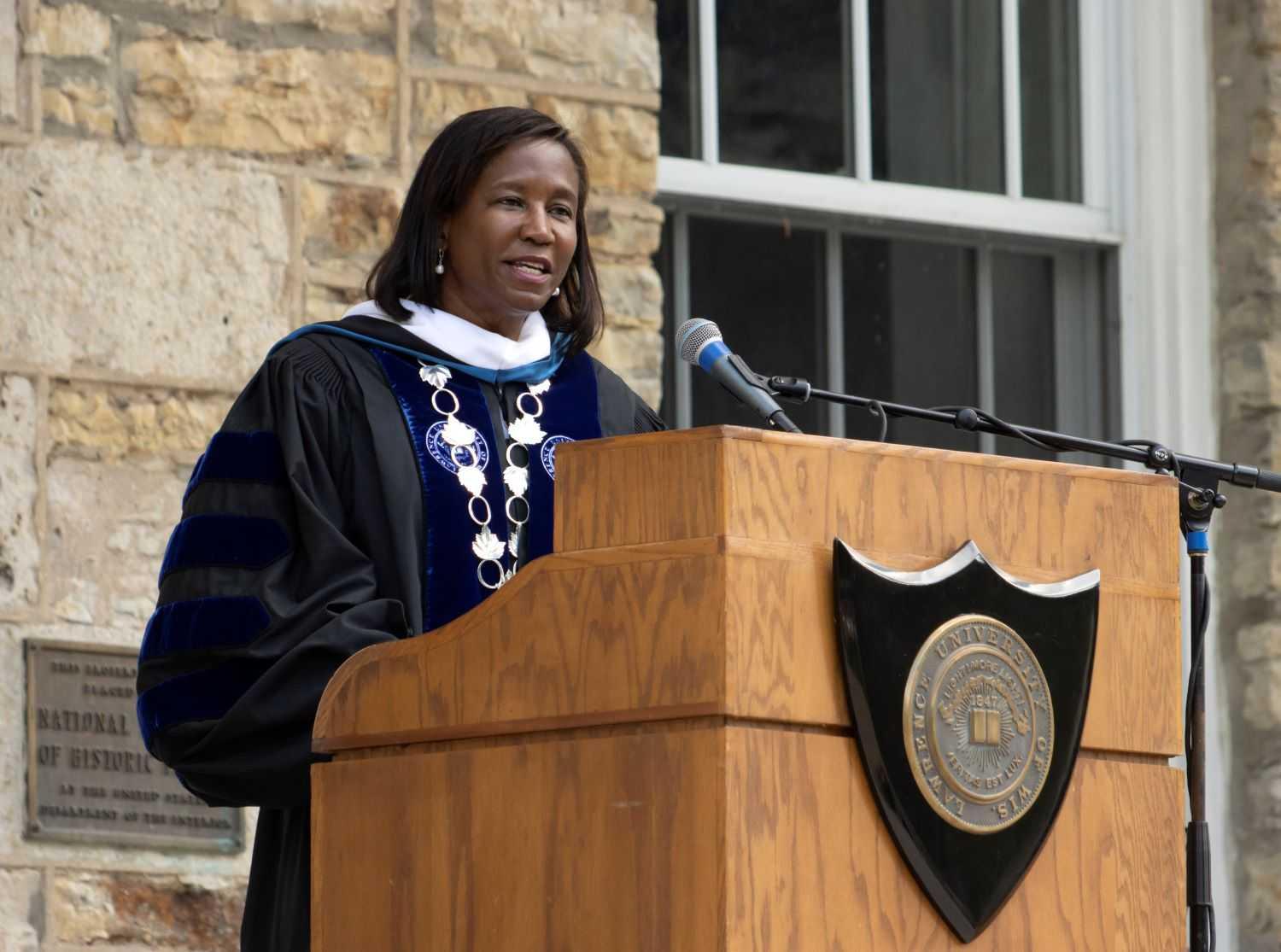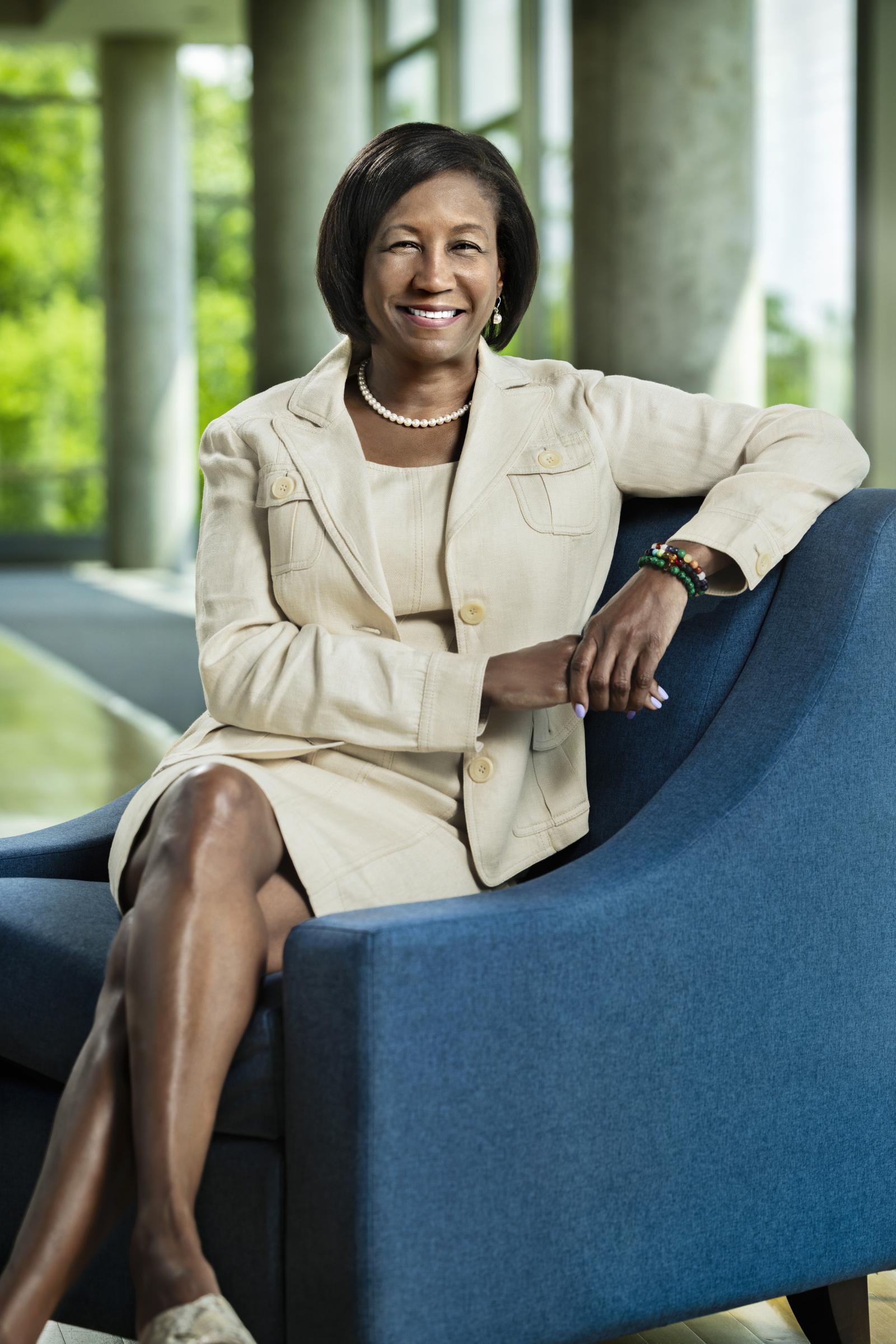President Laurie A. Carter watched from the portico in front of Main Hall as John Holiday took the microphone to greet incoming students and their families on a beautiful September afternoon.
The annual welcome event for new students, typically held in Memorial Chapel but moved outdoors, was Carter’s first as Lawrence president, and it was a visible reminder that we are together again—students, faculty, and staff—even while adapting to pandemic protocols. The mantra that Carter and the Lawrence University staff had introduced as Fall Term arrived, “Brighter Together,” was on full display as the sun shone above Main Hall. Holiday, the celebrated countertenor who teaches in the Conservatory of Music, leaned into all that togetherness and asked those in attendance to sing along to This Little Light of Mine.
They sang. They clapped. They smiled.
And it was at that moment, Carter said, that she knew this community was ready to reconnect.
“This idea of singing together, that we were going to let our light shine; it was a moment that really embodied ‘Brighter Together’ and set the tone for how we were going to support each other as a community,” she said.
For Carter, who began her tenure at Lawrence on July 1, the new student welcome event and the Matriculation Convocation that followed later in the week served as a public introduction to the campus community. It came at a pivotal moment in Lawrence’s 174-year history, with faculty and students returning to the classroom after four terms of distance learning.
Nurturing that re-entry was and has been priority No. 1 across campus.
Carter came to Lawrence from Shippensburg University in Pennsylvania, where she had served as president since 2017. Her work history includes a 25-year stint in various leadership positions at the Juilliard School in New York City and several years as an executive vice president at Eastern Kentucky University. Lawrence’s Board of Trustees selected her as the university’s 17th president following a unanimous recommendation from the Presidential Search Committee.
Carter said she’s been doing a lot of listening these first few months. She’s met with faculty from across the college and Conservatory, discussed opportunities in Athletics, began important dialogue with alumni, and has been having substantial conversations with students about everything from academics to student life to equity.
Read more: 17 things to know about Laurie Carter
Carter helps welcome incoming class
Carter delivers first Matriculation Convocation
The takeaways have been many, not the least of which is how passionate Lawrence students are to be involved—from shared governance on campus to global issues surrounding climate change and social justice.
The focus in most every conversation across campus, Carter said, has been squarely on the students and their well-being. The pandemic and the needed shift to distance learning changed things, rerouted paths, added new stressors. And it came during a time of political polarization and a social justice movement that reshaped national and local conversations. Students returned to the classroom this fall, but the world had changed. Meeting their needs in this moment has been paramount for their future and for Lawrence’s path forward.
“They felt a loss of not being able to connect with their faculty, their peers, the staff last year in the way they were accustomed to,” Carter said. “They knew this year wouldn’t be going back to what they knew because we’d still be masked, we still had to be careful, but their enthusiasm for being here and the way they embraced everything they had to do just to be together as a community has been inspiring.”
Being resilient

President Laurie Carter joins a percussion session during Mile of Music.
Every campus across the country has had to adapt during the pandemic. Lawrence, Carter said, has risen to the challenge in large part because students, faculty, and staff have worked together to Honor the Pledge while maintaining a commitment to academic excellence. Seeing that resilience up close has been a comforting thing in an uncomfortable time.
“Everyone is really taking care of one another,” Carter said. “They want to be on campus, they want campus to be healthy and safe, and the community is really working together to make that happen.”
She praised the commitment of staff through it all, including in preparations for students returning in the fall and efforts to keep campus operational and safe.
“This staff has really gone above and beyond,” Carter said. “When our campus was not quite ready for our students to return, our staff really pitched in to help beautify the campus and come together. That’s one example. They are an integral part of everything we do.”
Carter has spent a lot of time meeting with faculty as she gets to know the Lawrence landscape. The depth of Lawrence’s commitment to academic excellence is admirable, she said, pointing to work being done in STEM fields as an example. The commitment from faculty has been evident as her conversations have traversed the various academic departments.
“I wouldn’t say anything has surprised me, but I am impressed by the depth of the curricular experience here,” Carter said. “And I’m really impressed by the faculty’s commitment to providing an innovative curricular approach that promotes equitable learning for all. Our faculty have worked really hard at that.”
Having spent a large portion of her career working in arts education, Carter was well acquainted with the Conservatory before coming to Lawrence. The depth of talent among faculty and students and the commitment to creativity and excellence is as advertised, she said.
“The talent is tremendous, and the energy is just fantastic,” she said. “I’ve been a fan of the Lawrence Conservatory for a long time, but being here and experiencing it really takes it up even higher. I think back to the Matriculation Convocation with the Welcome Week Choir, which literally had days to pull together a choral performance that took my breath away.”
Carter said she’s been particularly impressed with the faculty-student relationship across campus. The nimbleness of faculty to respond to student needs—a product of an 8-to-1 faculty to student ratio—is something you can’t completely grasp until you see it in action, she said.
“The faculty support for students is one of the real pieces of Lawrence that you don’t see in many other places,” she said. “The depth of that support. They’re not just in the classroom or in the lab with the students; they are really guiding students through this transformative time in the student’s life. Yes, they are academic advisors, but they’re really advisors for how the liberal arts curriculum can lift a life, how the liberal arts curriculum can inform a life, and how a liberal arts curriculum can really prepare a life for the kind of success our alumni have had.”
That’s been reflected in conversations with alumni as well, Carter said. The passion Lawrentians have for their alma mater runs deep. That has come through loud and clear.
“They are passionate about this place and its history, and they honor that in the way they live their lives and give back to the community with their time, their talents, and their treasures,” Carter said. “It really demonstrates what a special place Lawrence is. That alumni are not just connected to one another but they are also connected to the institution in a meaningful way.”
Carter expects to see that play out in numerous ways as Lawrence prepares to mark its 175th anniversary in 2022. There is much to celebrate and much to build on. There is a commitment to embracing the history of Lawrence and Milwaukee-Downer College, and Carter said she has felt that in the passionate words of alumni as they’ve talked about their own experiences and their vision for Lawrence going forward.
“It is critical that we honor the history and the traditions of Lawrence in everything we do,” she said. “At the core of an adaptive leadership model is taking the DNA of a place and building on it. That’s what we’re doing. Lawrence’s DNA is so strong, and the traditions are really an integral part of how the university operates. Being able to honor those and do it in a way that’s forward-looking and forward-thinking is actually quite wonderful because the foundation is so strong.”
That includes athletics, Carter said, calling the commitment of Lawrence’s student-athletes extraordinary. Athletes make up 30% of this year’s first-year class. A quarter of all Lawrence students participate on one of the school’s 22 varsity teams.
Carter, a standout track and field athlete during her undergraduate days at Clarion University, said support for Lawrence’s student-athletes is strong but she wants to see that grow across campus. She’s listening to ideas on how to make that happen.
“This community really knows how to support one another,” she said. “Can we deepen those connections with our athletes? Absolutely. Will we? Absolutely. We will strengthen the connections between Athletics and the rest of the campus.”
A new home

President Laurie Carter speaks to new students and their families at a welcome event that preceded the opening of Fall Term.
Carter also said she’s been listening to the Appleton community as she settles into her new home. Lawrence’s relationship with Appleton and the wider Fox Cities needs to be tended to, she said.
Carter has already met with Lawrence alumnus and Appleton Mayor Jake Woodford ’13 several times. She’s been impressed with how responsive he and his staff have been. She also was excited to see the community participation in the outdoor Indigenous Peoples’ Day event on campus in early October, and she applauded the community connections being built by Lawrence’s Career Center and the Center for Community Engagement and Social Change.
Those are all building blocks that will help to build a stronger relationship, one fortified with mutual respect and a commitment to make sure this is and always will be a welcoming environment for everyone.
“Lawrence is right in the middle of this community,” Carter said. “We are a part of it. We want our students to understand how to be good neighbors and how to contribute to the community in which they are living.”
Carter said she quickly became a fan of the Downtown Appleton Farmers Market. She’s enjoyed Art at the Park and other community activities in Appleton’s parks, took in Mile of Music, and loves walking on trails near campus. She and her husband and son have been exploring Appleton slowly but surely, all with pandemic safety in mind.
“I think what we’ve probably availed ourselves of more than anything else are the restaurants,” Carter said. “There are some really good restaurants in Appleton. Good food, good service, really nice environments. We just really love this community.”
In the end, Carter said, all of her conversations circle back to Lawrence’s students and how they can build positive connections in classrooms, across campus, and in the surrounding community. That togetherness—”Brighter Together”—will be at the heart of Lawrence’s future success.
“We have to make sure the students feel our arms around them,” Carter said.




